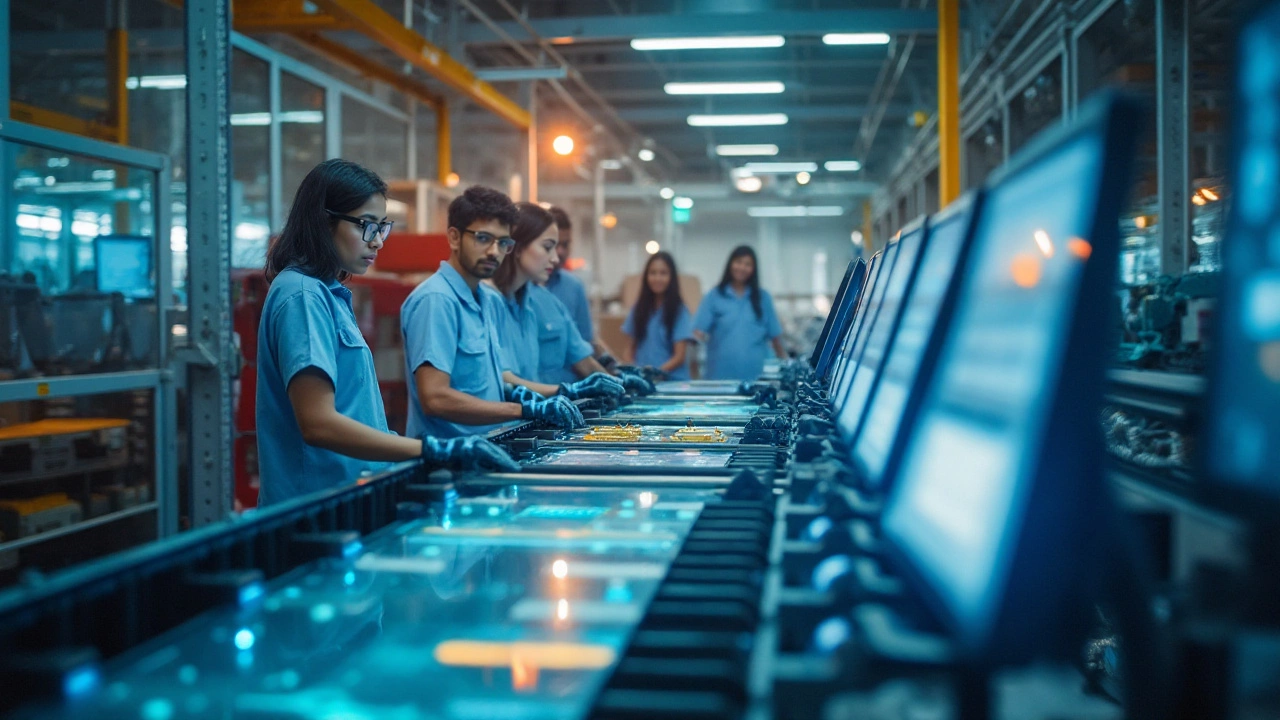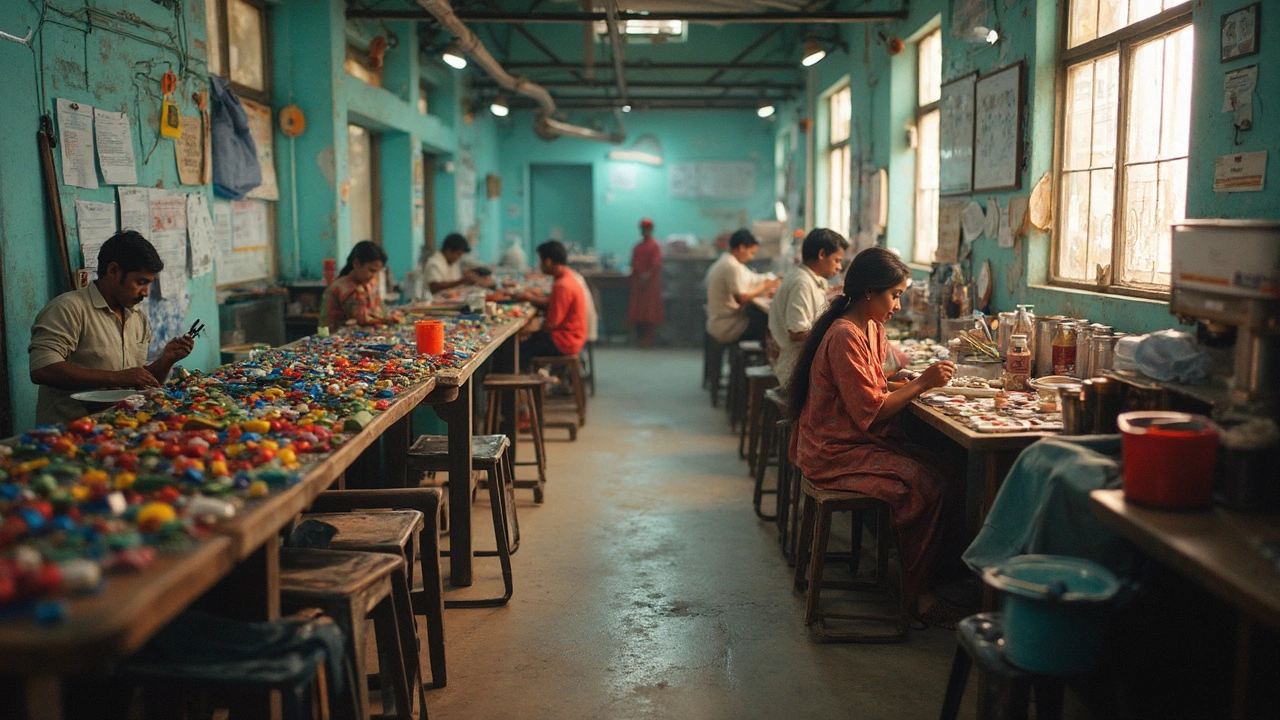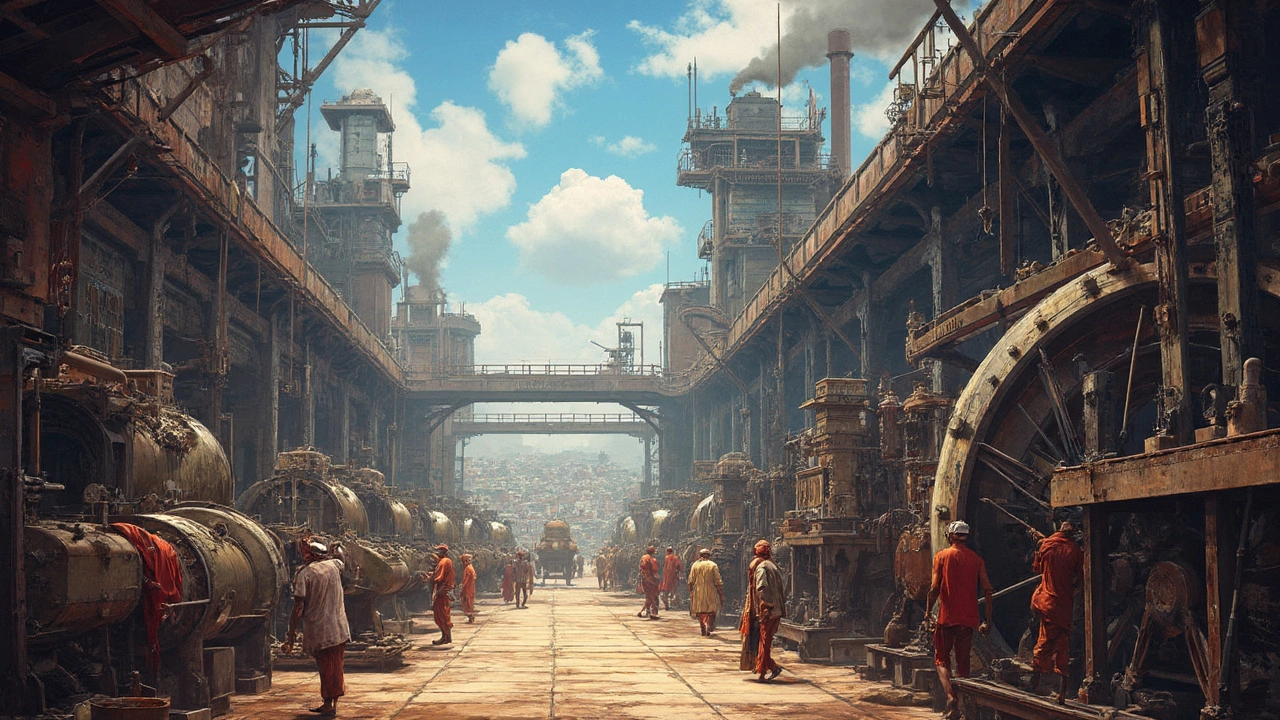Top 5 Chemical Manufacturing Companies in India: Leaders and Insights
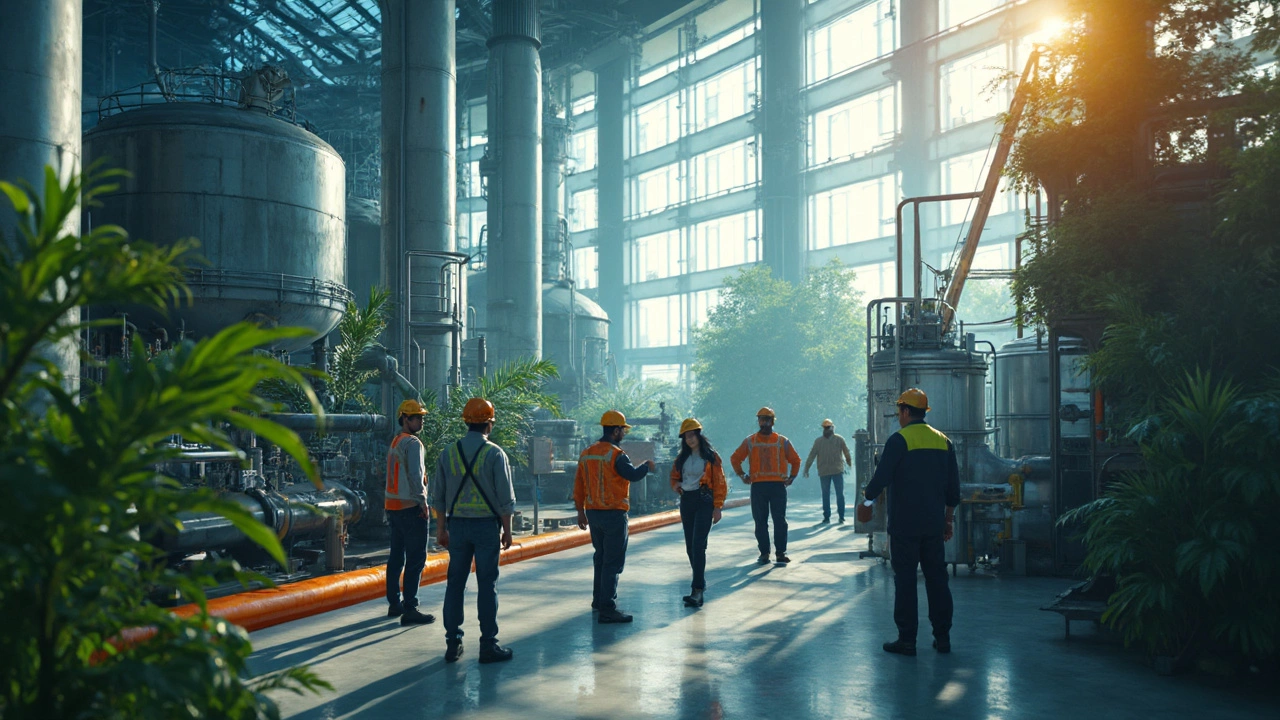
If you think chemicals are just background players in the world of business, think again. In India, chemical manufacturing is a powerhouse—quietly fueling everything from food packaging and textiles to pharmaceuticals and agriculture. The sector is huge: according to the Indian Brand Equity Foundation, it's expected to hit $300 billion by 2025. That's not just big, that's gigantic.
The big question is: which companies really set the pace in this market? Not all chemical manufacturers are made equal. Some have factories across multiple states, massive research teams, and export networks reaching far corners of the world. Others focus on specialties and deliver products so pure that global brands come knocking. Knowing who leads the pack can save your business money, time, and plenty of stress.
If you’re trying to choose a supplier, or just want to get your head around the industry, you can't afford to look at old lists or go by random rankings. The real leaders have earned their spot through a mix of quality, innovation, customer support, and scale. And trust me, their names pop up for a reason—regularly making headlines when they sign billion-dollar deals or launch eco-friendly products. Let’s take a practical look at who’s crushing it and what you can learn from their approach.
- Why Chemical Manufacturing Matters in India
- Spotlight on the Top 5 Companies
- How These Companies Stand Out
- Tips for Choosing the Right Chemical Manufacturer
Why Chemical Manufacturing Matters in India
The chemical manufacturing India sector isn’t just a number on a spreadsheet. It sits at the heart of what keeps our everyday world running. Paint, medicine, fertilizer for farming—even your favorite snacks—rely on raw materials and ingredients from chemical producers.
India isn’t just a big player; it’s ranked sixth globally for chemical sales. And get this: the sector brings in over $180 billion every year and contributes almost 7% to the country’s GDP. That’s a huge chunk driving jobs, exports, and growth. The industry is also one of the largest employers, with more than two million people working directly or indirectly in chemical production, transport, and distribution.
- India exports chemicals to over 175 countries. Major markets are China, USA, Brazil, and Saudi Arabia.
- Bulk chemicals make up about 35% of the industry, but India is rapidly expanding into specialties like dyes and agrochemicals, which have bigger profit margins.
- The Indian government recognizes chemicals as a key industry and often rolls out incentives and special zones to attract more investment.
| Sector | Annual Value (USD Billion) | World Rank |
|---|---|---|
| Overall Chemicals | 180 | 6th |
| Specialty Chemicals | 32 | 4th |
| Dyes & Pigments | 6 | 1st |
For anyone in manufacturing, agriculture, FMCG, or pharma, a reliable chemical partner isn’t a luxury—it’s what keeps your business moving. And with technology developing fast and the shift to green chemistry picking up steam, getting close to the right chemical supplier is more important than ever. If you work with these companies, you’re right at the cutting edge of what’s happening next in Indian industry.
Spotlight on the Top 5 Companies
When people talk about chemical manufacturing India, these five companies always lead the conversation. From global reach to market value, they've set the benchmarks everyone else is chasing. Here’s what makes each of them stand out right now.
| Company | Founded | Headquarters | Key Products/Segments | FY24 Revenue (in ₹ crores) |
|---|---|---|---|---|
| Reliance Industries (Chemicals Division) | 1966 | Mumbai, Maharashtra | Polymers, Petrochem, Life Sciences | 266,400* |
| Tata Chemicals | 1939 | Mumbai, Maharashtra | Soda Ash, Specialty Chemicals, Nutraceuticals | 16,662 |
| UPL Ltd. | 1969 | Mumbai, Maharashtra | Agrichemicals, Specialty Chemicals, Industrial Chemicals | 54,397 |
| SRF Limited | 1970 | Gurugram, Haryana | Fluorochemicals, Technical Textiles, Packaging Films | 14,870 |
| Aarti Industries | 1984 | Mumbai, Maharashtra | Pharma Intermediates, Specialty Chemicals | 8,613 |
*Reliance Industries (Chemicals Division) figure is an estimate based on their latest annual report, as their chemical business integrates with refining and other operations.
- Reliance Industries – Think scale and innovation. With a chunk of their revenue stemming from petrochemicals and polymers, Reliance is not just one of India’s biggest chemical companies, but also a global player. They have massive plants in Jamnagar and Hazira, and they're pushing hard on green chemistry and recycling.
- Tata Chemicals – Tata isn’t just an old name, it’s a smart one. They lead in soda ash production (a must for glass and detergents) and have a solid play in nutrition science. They're all about research, especially with their innovation center near Pune focused on specialty ingredients.
- UPL Ltd. – If you work anywhere near agriculture, you know UPL. They're the fifth-largest agrochemical company in the world, exporting to over 130 countries. UPL doesn’t just produce pesticides—they invest in sustainable farming tech to help Indian and global farmers deal with changing weather and pest patterns.
- SRF Limited – SRF runs India’s largest refrigerant plant (yes, the stuff that cools your air conditioners) and exports technical textiles and packaging films worldwide. They focus on niche chemicals used in healthcare, electronics, and even spacecraft technology.
- Aarti Industries – Smaller, but laser-focused. Aarti supplies over 400 products, many of them custom-made chemicals for big clients in pharma and dyes. More than 50% of what they make leaves India for markets mostly in the US and Europe.
You might want to pick a supplier based on size, export potential, or investments in eco-friendly tech. These companies are trendsetters for different reasons, but all have serious reputations for quality, reliability, and global reach.
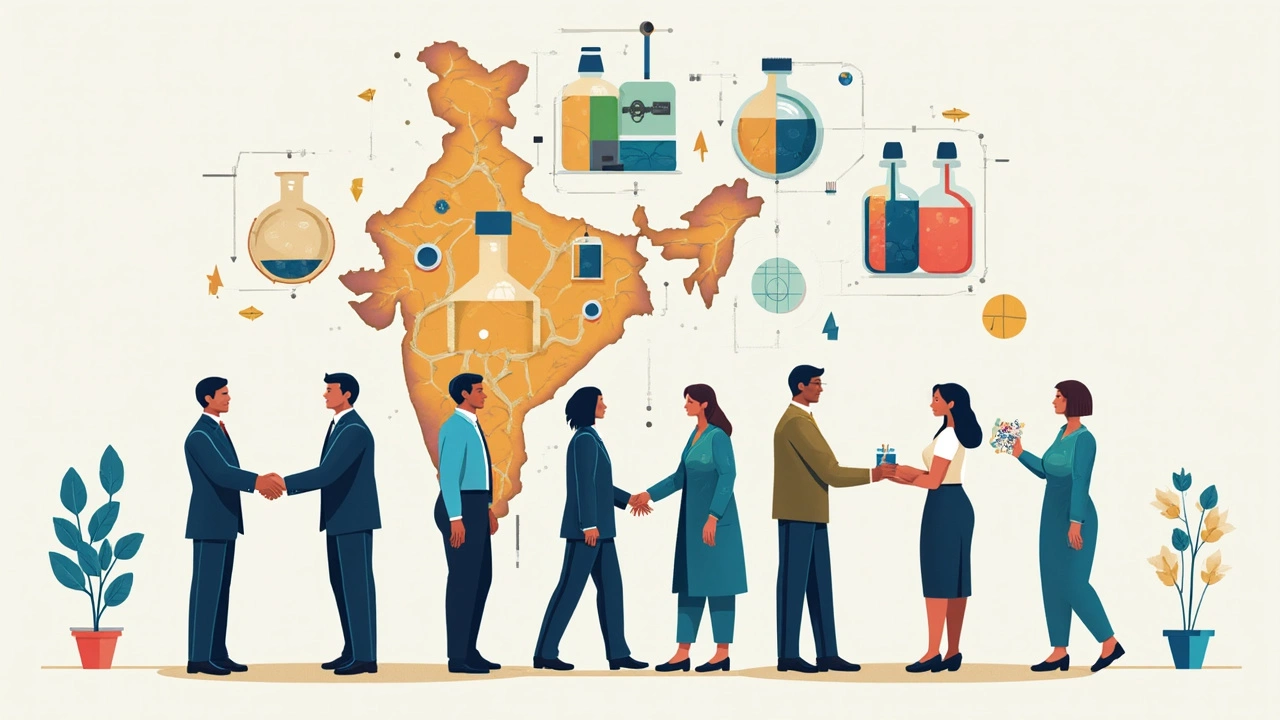
How These Companies Stand Out
What really makes the top players special in the chemical manufacturing India scene? It’s not just about selling more chemicals. These companies have found ways to get ahead through innovation, scale, and solid reputations that actually mean something when you’re looking at raw numbers and global reach.
For example, Tata Chemicals is known for its commitment to sustainability. The company has launched green production methods, cut down on waste, and even runs one of the world's largest saltworks in Mithapur, Gujarat. Besides caring for the environment, Tata’s global supply chain means they can deliver exactly when needed, backed up with strict quality checks most competitors can’t match.
SRF Limited, on the other hand, is all about specialty chemicals used in refrigeration, pharma, and agro products. They invest heavily in research, so every year, their team comes up with smarter, cleaner, and safer chemicals. SRF holds dozens of patents in India and internationally. That tells you just how much they focus on staying ahead in technology, not just production volume.
UPL isn’t just an Indian name—it’s a global one, ranking high amongst the world’s crop protection companies. They stand out because of their distribution network reaching over 130 countries, which makes them a no-brainer if you want international scale and reliability. UPL invests in farmer education programs and offers after-sales support that goes way beyond the basics.
Aarti Industries focuses on process innovation and cost leadership. Instead of following trends, they often set them by lowering production costs and passing the savings to clients. You’ll find their chemicals in pharmaceuticals, polymers, and even high-tech electronics. Their flexible manufacturing lines help them react fast to new market demands, which is huge when supply chain glitches hit.
And don’t overlook Atul Ltd, one of the oldest chemical names in India. They’re prized for having hundreds of products across over 30 sectors, and they’ve built long-term supply partnerships with firms both in India and globally. Atul’s culture is all about high standards—whether it’s compliance, technical support, or plain old customer service—which keeps clients coming back.
- Fact: Most leaders in India’s chemical industry are heavily focused on R&D investments. That’s why you see continuous improvements and fewer product recalls.
- Companies like Tata Chemicals and UPL have sustainability reports published every year, showing transparency and real action—not just grand promises.
- Look for IS0 9001 and ISO 14001 certifications. The top companies all have them, telling you their operations are reliable and environmentally aware.
The lesson? Don’t just go by size or headline deals. The real value these companies bring is in how they keep evolving with technology, protect their reputation, and solve real industry problems every single day.
Tips for Choosing the Right Chemical Manufacturer
Picking a chemical manufacturer is a big deal—one wrong move and you might be dealing with poor product quality, shipping delays, or even regulatory trouble. So, how do you avoid the usual headaches? Here’s what actually matters.
- Chemical manufacturing India industry leaders often follow strict global standards. Always check if the company is certified by ISO (like ISO 9001 for quality) or has REACH and GOTS certificates for exports. These aren’t just stickers; they mean international buyers trust them too.
- Ask about their supply chain. Reliable companies share info on how fast they ship and where their factories are. Look for a partner with not just the lowest price, but fast response and solid backup inventory.
- Don’t ignore customer support. Big players like Aarti Industries and Tata Chemicals have multilingual teams and offer after-sales help, which can save your project if something goes wrong.
- Does the manufacturer invest in innovation? Many Indian leaders are pouring money into R&D—Gujarat Alkalies and Atul Ltd have dedicated labs and regularly launch new environment-friendly products.
- Check for transparency. A credible manufacturer will let you audit their plant, show real safety records, and share product data sheets without you begging for them.
Take a look at this table showing how some of the biggest Indian manufacturers compare on critical factors:
| Company Name | ISO Certified | Number of R&D Centers | Export Countries | Customer Support |
|---|---|---|---|---|
| Tata Chemicals | Yes (ISO 9001, 14001) | 3 | 40+ | 24/7 Multilingual |
| Aarti Industries | Yes (ISO 9001, 14001) | 2 | 60+ | Bilingual, Regular Updates |
| Gujarat Alkalies | Yes (ISO 9001) | 1 | 25+ | Email & Phone |
Don’t settle for the first factory that sends a brochure. Compare their credentials, ask for case studies, and get them to commit to timelines in writing. The right choice keeps your production running and your buyers happy.

